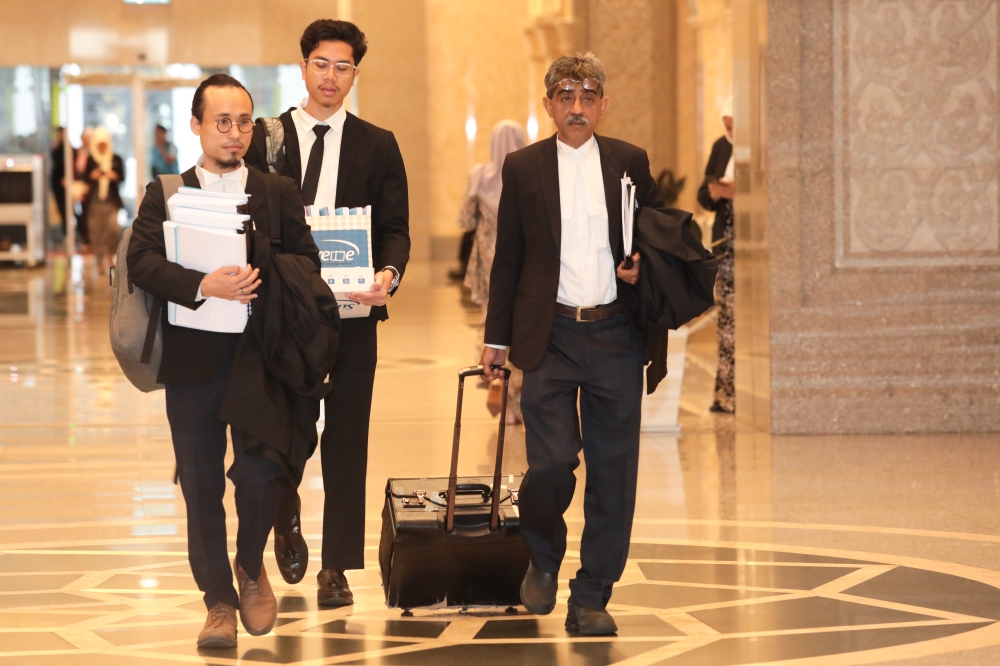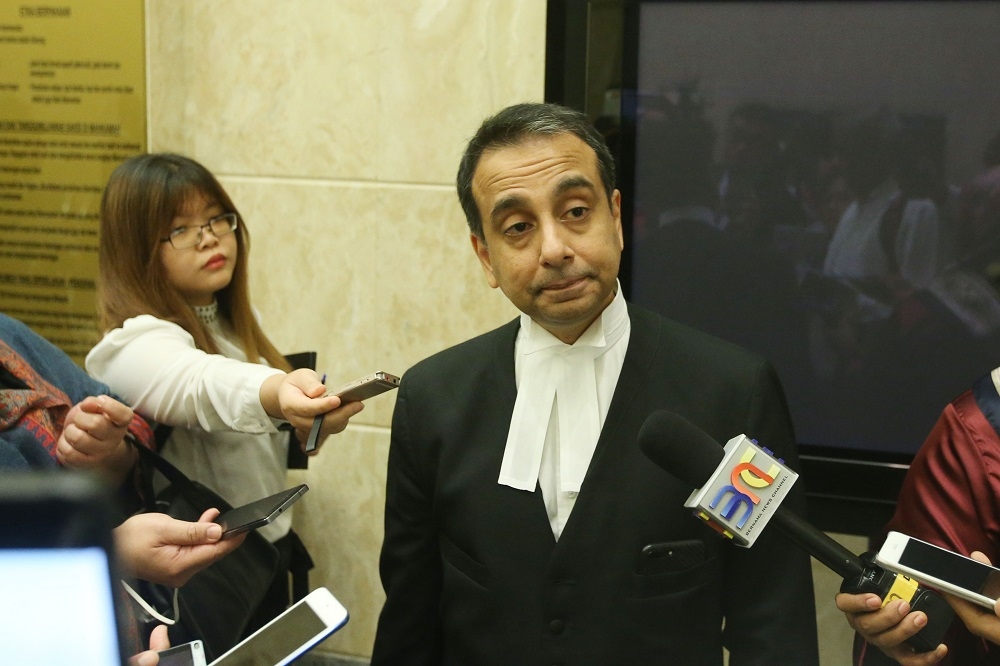PUTRAJAYA, Feb 20 — The Federal Court today in a majority decision rejected two non-governmental organisations' (NGOs) application for leave to appeal against a previous court ruling which found vernacular schools to be constitutional, which means the existence of vernacular schools in Malaysia continues to remain legal.
Justice Datuk Mary Lim Thiam Suan, who chaired the Federal Court's three-judge panel, delivered the majority decision which was agreed to by Federal Court judge Datuk Rhodzariah Bujang.
Federal Court judge Datuk Abdul Karim Abdul Jalil dissented.
Two non-governmental organisations who had challenged the constitutionality of vernacular schools — Islamic Education Development Council (Mappim) and Confederation of Malaysian Writers Association (Gapena) — had wanted to pursue their appeal.
As Mappim and Gapena failed to obtain leave for appeal, this means the Federal Court will not be hearing their appeal, and the Court of Appeal's decision — which found vernacular schools to be constitutional — still stands.
Mappim and Gapena had previously failed at both the High Court and Court of Appeal to challenge the constitutionality and legality of vernacular schools.
What the Federal Court said
After nearly two hours of court proceedings and 20 minutes of deliberations, the Federal Court panel’s chair Lim thanked lawyers for all parties for their submissions, before delivering her brief judgment for the majority of the panel.
“This is a majority decision. We are not satisfied that we ought or should exercise our discretion to grant leave on the amended question under Section 96(b) of the Courts of Judicature Act 1964,” she said, adding that Mappim’s and Gapena’s application for leave to appeal would also not fulfil the requirements under Section 96(a) of the same law.
After having stated that the two NGOs’ bid for leave to appeal failed to meet the requirements of both Section 96(a) and Section 96(b), Lim said the Federal Court dismissed Mappim and Gapena’s leave application without any order for costs.
In Malaysia, those who wish to appeal to the Federal Court against Court of Appeal decisions for civil cases must first obtain leave from the Federal Court for the appeal to be heard.
The conditions to obtain leave for appeal from the Federal Court are namely Section 96(a) and Section 96(b).
Section 96(a) is when leave for appeal is being sought for a question of general principle being decided for the first time or an important question where it would be to the public advantage to have a Federal Court decision, while Section 96(b) is when leave for appeal is being sought when it involves the effect of any provision in the Federal Constitution including the validity of any written law relating to such constitutional provisions.
While Mappim and Gapena had previously listed eight legal and constitutional questions that they wanted the Federal Court to grant leave on and to decide on, the two NGOs’ lead lawyer Mohamed Haniff Khatri Abdulla this morning informed the Federal Court that they were proposing to just apply for leave based on one of the eight questions.
Haniff amended this question by inserting the words “medium of instruction” and had only relied on Section 96(b) to argue that Mappim and Gapena should be granted leave of appeal for this question.

This is the amended question which the two NGOs had wanted to obtain leave for the Federal Court to hear and decide on, but ultimately failed to get leave on: “Whether medium of instruction in the process of teaching and learning in the Chinese and Tamil national type schools, established under Sections 2, 17, and 28 of the Education Act 1996 [Act 550], are official purposes, and therefore subjected to the obligation under Article 152(1) of the Federal Constitution, which requires the use of the national language for all official purposes?”
Out of the 12 respondents in the appeal, only two respondents agreed to the amended question and agreed for leave of appeal to be granted to Mappim and Gapena.
These two respondents are the 11th respondent (Persatuan Gabungan Kebajikan Guru-guru Bersara Sekolah Tamil Malaysia); and the 12th respondent (collectively the three organisations, Majlis Bahasa Cina Malaysia; Persatuan Tamil Neri Malaysia; and Gabungan Persatuan Bekas Pelajar Sekolah Tamil Malaysia (Pertama)).
The other 10 respondents — including the education minister and the Malaysian government — all opposed this constitutional question which the two NGOs had wanted to get leave for appeal on.
What the lawyers argued
Senior federal counsel Liew Horng Bin, who represented the education minister and Malaysian government, noted a previous court judgment at the Federal Court where then chief judge of Sabah and Sarawak Tan Sri Richard Malanjum (in the case involving the local Catholic church’s weekly Herald) said court decisions on applications for leave to appeal via Section 96(b) should also consider the degree of public importance and necessity of legal issue being resolved by the Federal Court.
Liew disagreed with Haniff’s argument that Mappim and Gapena only needed to show they meet Section 96(b) requirements and would be entitled as of right to receive leave for appeal from the Federal Court, saying instead that it is up to the Federal Court to exercise its discretion on whether to grant leave for appeal under Section 96(b) and further argued the Federal Court should consider whether the issue is important enough to justify the granting of leave.
In other words, Liew was arguing that Section 96(b) does not offer free passage to appeal at the Federal Court or is not an open ticket to appeal.
In objecting to the amended leave question by Mappim and Gapena, Liew highlighted Education Minister Fadhlina Sidek’s remarks on January 23 this year in an interview with radio station BFM, quoting her as having said that she is in a position to “support” vernacular schools.
Liew also quoted Fadhlina as having said in the interview that there is no question of vernacular schools being “not permissible” or “not legal” or something that “divides us”, and noted that she had also said that “we have no problem” with vernacular schools.
Siding with Fadhlina’s views, Liew said this was a stand taken by the government of the desire to maintain and to sustain and preserve vernacular schools in line with Article 152(1)(b) of the Federal Constitution.
While Article 152(1) states that Malaysia’s national language is the Malay language, Article 152(1)(a) states that no one shall be prohibited or prevented from teaching or learning any other language or from using any other language (if it is not for “official purposes).
Article 152(1)(b) provides for the federal government’s right or any state government’s right to “preserve and sustain the use and study of the language of any other community” in Malaysia.
Datuk Malik Imtiaz Sarwar, who represented the eighth respondent Chong Hwa Independent High School of Kuala Lumpur, presented his arguments on behalf of the other respondents who were also objecting to leave being granted to Mappim and Gapena. Seven other respondents adopted his submissions.
Among other things, Imtiaz argued that the Federal Court has the discretion under Section 96(b) on whether to grant leave for appeal, but said the granting of leave is not a “low-hanging fruit”.
Imtiaz argued that leave for appeal should not be granted merely because a constitutional question is interesting, but said the Federal Court should consider whether the legal issue is of public importance and if there is any “useful purpose” for the Federal Court to spend time and resources to hear Mappim’s and Gapena’s appeal based on the amended question.

Also disagreeing with Haniff’s view that Mappim and Gapena would have the right to appeal to the Federal Court once they could point to constitutional provisions being in issue, Imtiaz said both Section 96(a) and Section 96(b) provides discretionary powers for the Federal Court to decide whether to grant leave to appeal and said this would avoid overburdening the court.
At one point, Imtiaz also noted the High Court’s observation that this court challenge against vernacular schools is an attempt to bring to an end to vernacular schools, agreeing: “I think that’s the truth of it, because honestly a vernacular school which does not teach in vernacular serves no purpose as vernacular schools. So this is really an attempt to bring an end to vernacular schools.”
Imtiaz also said that there is no error in the Court of Appeal’s decision which would justify the granting of leave to appeal, saying that both the High Court and Court of Appeal decisions --- which found vernacular schools to be constitutional --- were clear and that the Court of Appeal decision would be sufficient precedent if any challenges are brought in court in the future against vernacular schools.
The seven other respondents who objected to leave for appeal being granted and adopted Imtiaz’s arguments are Parti Gerakan Rakyat Malaysia; MIC; MCA; United Chinese School Teachers’ Association of Malaysia (Jiao Zong); United Chinese School Committees’ Association of Malaysia (Dong Zong); Persatuan Thamizhar Malaysia; and Persatuan Tamilar Thirunal Perak.
Haniff disagreed that Section 96(b) should involve other considerations and said the condition for leave for appeal should follow only what is stated under Section 96(b).
Alternatively, Haniff argued that there is public interest in this matter since vernacular schools have never been challenged in the courts since Merdeka until now, and that it would be in the public interest to have finality by having the Federal Court — the highest court in Malaysia — decide on the matter.
Haniff speculated that the lack of a Federal Court decision would carry the risk of future challenges being brought in court in the future against vernacular schools, but acknowledged to the Federal Court that this was a “speculative” remark.
Citing portions of the Court of Appeal’s decision in this case, Haniff also argued that Mappim and Gapena have a chance at succeeding in the appeal if leave for appeal is granted.
Read here for Malay Mail’s simplified summary of the Court of Appeal’s 41-page judgment over the vernacular schools matter.
Read here for what Chinese education groups Dong Zong’s and Jiao Zong’s lawyer said regarding the effect of today’s Federal Court decision.





















